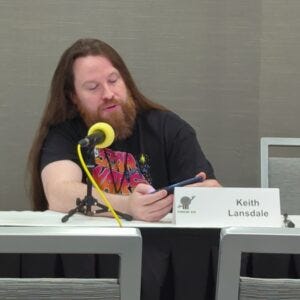Sunday Salutations from Post-FenCon
This is a longer post because we condensed three days of writing advice from authors into just under two thousand words. Be prepared to be deluged with advice.
This weekend, we attended Anna’s second convention ever FenCon (http://fencon.org/). Reminder, her first convention was P-Con last year. https://www.p-con.us (Yes, it was another Texas con… I wonder why? -Anna) While we had a lot of fun but missed being able to meet other AlphaMercs (https://alphamercs.com) while at Fen Con, maybe next year. We can hope. Still, we saw some familiar faces and met some new people wo became familiar faces.
So, for those of that have gone to cons, what is your favorite writer’s convention?
Since FenCon is mostly a writer’s convention and we are new authors, we focused on panels that concerned writing. However, I think a lot of what was discussed will also be interesting to non-writers – at least, I hope it is. Because I tend to forget things, I took notes during the panels, but my apologies if any concepts are misattributed. Still, I don’t think anything was particularly controversial so hopefully it won’t get anyone’s dander up.
On Friday, the first panel we attended was Monsters Under the Bed. David Rike (https://holocaustengine.com/) gave a great classic definition of monster, saying that a monster is something that wants to kill you and that transgresses against nature. Ted Pennella (upcoming book, Infinity) countered by suggesting that monsters are the product of a bored person’s creativity combined with the proximity of someone else who is afraid of the dark. Regardless of which side you choose, both are good takeaways for this panel.
Next up was the panel Moderating 101. As aspiring writers, we hope someday to be forced to be on panels and be moderators, so we thought this could be interesting. Teresa Patterson reminded everyone of what we heard at P-Con, the moderator is not on the panel. They should be the moderator and not take part, but instead feed the panelist. Dr. Jancy McPhee recommended having questions prepared beforehand, a suggestion seconded by everyone! Dominick D’Aunno says he talks with the panelists beforehand and asks about topics the panelists want to cover or want to avoid. John Black (https://jonblackwrites.com/) said he looks for unique panelist backgrounds to incorporate into the panel. His last piece of advice was classic and helpful for writing or science panels alike, make sure your question is in the form of a question. Something that both moderators and audience members often forget.
To finish out Friday, we attended You and I and Her: The Magic of Point of View for Writers and Readers. We will sum up this panel by pointing out two things that A. Lee Martinez (https://aleemartinez.com/) said. First, the author should pick the point of view based on the mood you want to create. Second, that as long as you execute it properly, readers don’t care about point of view as much as writers do.
Saturday morning started with Meet Keith Lansdale. Keith was really fun to talk with, and friendly throughout the con. This panel was mostly him doing a reading of an upcoming short story titled “Elijah’s Elixir”. We will be looking for it when it is out, since we only got the first two thirds. It’s a weird west story, with a touch of humor and possibly horror. We never found out what was happening, and we really want to know! (I think this was Tod’s favorite panel and he doesn’t usually like readings. So far though I have loved all the readings I have gone to. -Anna)
We followed Keith to his next panel How to Turn Your Idea or Book into a Graphic Novel. R Cat Conrad, Alan J Porter, DL Young, and the aforementioned Keith Lansdale gave a lot of great advice that boils down to these three points.
1. Pick an artist who can read your mind and draw what you’re thinking.
2. Pick an artist who is themselves a storyteller, with pictures instead of words.
3. Pick an artist who is alive.
Point three became unexpectedly important to at least one of the panelists.
Then being new writers, we wanted to learn more about the Writing Industry Upheaval. In this case, the panelists mostly discussed the death of the midlist novel, caused by the elimination of the mass market paperback. It ended up being an informed historical discussion of what they had experienced. However, there was one big take away, read the fine print of a contract. Specifically, items to look for contracts:
1. Make sure that the contract specifies the book will be printed (as in a dead tree copy) since some publishers may try to do ebook only when most of your fans want paper.
2. To help you recover from changes in the market and your publisher, make sure the contract has a time limit, at which time rights revert to you.
While, did have some breaks one of the panels Anna was really excited to go to was about writing for young adults, mostly because she still loves so many of the writers she read growing up as well as older items like Heinlein Juveniles which shaped my childhood. In Young Adult Focused Writing, the next panel, the discussion was less focused, but we will let Kathleen Baldwin (https://kathleenbaldwin.com/) sum things up with, like any writing, you include relatable characters with both ordinary and extraordinary problems.
The next panel, Here a Mentor There a Mentor, found us rejoining Keith Lansdale, who along with Selina Rosen (https://selinarosen.com/) created way too much energy for the room to contain. One piece of advice from most of their mentors was to remove backstory from the front of the story. This was interesting, since we’d run into this same suggestion recently in our critique group. But we will close the panel with advice that C.J. Cherryh gave Selina Rosen, to write s**t but edit brilliantly – in other words, just get the words on the page, but spend time as needed editing.
We’ll close Saturday with the panel Mythology and Modern Literature. This panel was mostly a retrospective of various writers and artists who created or used mythology in their writing. We were intrigued that Kim Redford (https://kimredford.com/) under one of her pseudonyms did at least one book about Texas Indian mythologies that we will be getting (https://www.ebooks.com/en-us/book/1061091/texas-indian-myths-legends/jane-arcger/).
Sunday opened with Build Better Aliens! Dominick D’Aunno, building on his physician background, suggested considering how your aliens get sick and what that would look like. Being a long-time fan of James White’s Sector General, I approved of this. However, the big question of somewhat human-like versus totally different aliens was best answered by Linda L Donahue who we first met at P-Con. “Damned if you do. Damned if you don’t.” Basically, a lot of people have strong feelings and both sides of the question, and you’ll hear from them.
The next panel was Podcasting 101, with Ben Gibbs, Mike Stewart, and Mur Lafferty. Voted best overall advice was an idea first presented by Mike Stewart but seconded by everyone: get a schedule and stick to it. If you don’t people will assume you’ve stopped and unsubscribe. Also, Mike Stewart agreed many podcasts have too much inane chitchat at the beginning, so I’ll have to try out his gaming podcast Save for Half (https://saveforhalf.com/).
Next, we went to Can Crowdfunding Financially Support Artists and Authors? The panelists were DL Young, Keith Lansdale, Adrian Simmons, and Mark Finn. People gave refreshingly consistent (but interestingly different) suggestions about running a Kickstarter. Basically, first, the vast majority of your contributors on Kickstarter come from your fans you are already connecting with. Generally, you will not magically find all of your funding going into Kickstarter without bringing fans in. The other big piece of advice was to find or pay for good advice when doing this (I would avoid paying for it if you can, but that is me. -Anna), since things like shipping or not knowing book supporters want a hardcover option can cause problems.
The penultimate panel was Beyond Jane and John: Creative Characters and Place Names. David Rike gave my favorite advice: cultures tend to give names based on their highest values. Egyptians gave names which represented either good attributes or power they wished to possess. In modern, technically hedonistic societies, names tend to be pleasant sounds (soft and lyrical) or those of popular people.
And the last panel was Science Fiction Meets Detective Fiction. I had two favorite takeaways from this one. Marshall Ryan Maresca (https://mrmaresca.com/wp/) said he liked that you could take the structure from mysteries and let science fiction or fantasy give you the setting. A. Lee Martinez reminded everyone that most stories are formulaic, we just pretend like they aren’t. We all thought that was why romance is so successful as a genre – romance usually has a sub-genre that matches exactly what you want.
We do have a few special shout outs.
We saw Stephen Patrick again (https://holocaustengine.com/). He writes with David Rike, who we actually saw more in panels. He spent a lot of time talking with us at P-Con and it was great to see him again.
Keith Lansdale spent a good deal of time talking with us. He was fun to talk with and had a lot of insights. It was fun meeting another horror writer who also writes in other genres.
Kim Redford (https://kimredford.com/) also gave us a lot of one-on-one time. We’re looking forward to her firefight cowboy romance (We said romance has a category for everything.) and her Texas Indian stories.
Anna and I talked to Dominick D’Aunno, but we never managed to talk to him together. We hope to talk more with him at some point. I also want to find out about his books. I heard they were about alien doctors, but I cannot find the titles and wasn’t able to get enough time to ask him as we ran from panel to panel.
Kathleen Baldwin (https://kathleenbaldwin.com/) and her husband had breakfast with us on Sunday morning. She gave us a lot of advice about young adult and middle grade writing. Hearing some of our story pitches, her response was the same as Jane Lindskold (https://janelindskold.wordpress.com/) – they both said we were writing young adult/middle grade stories. So, we will see where that goes.




